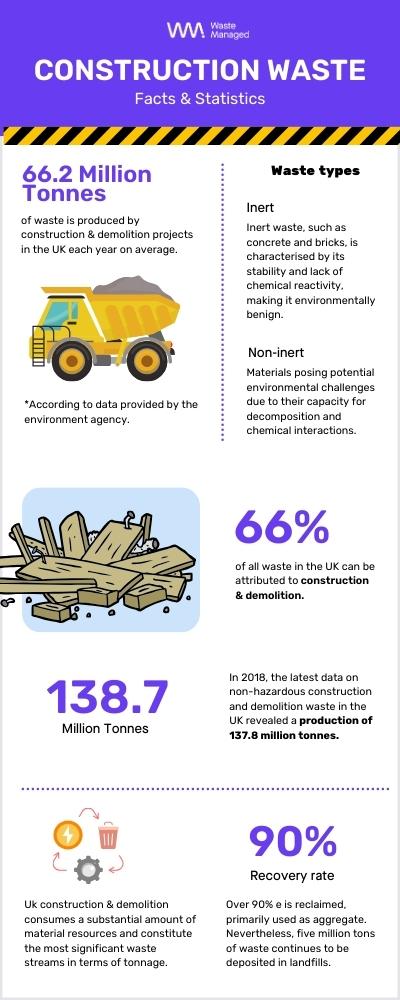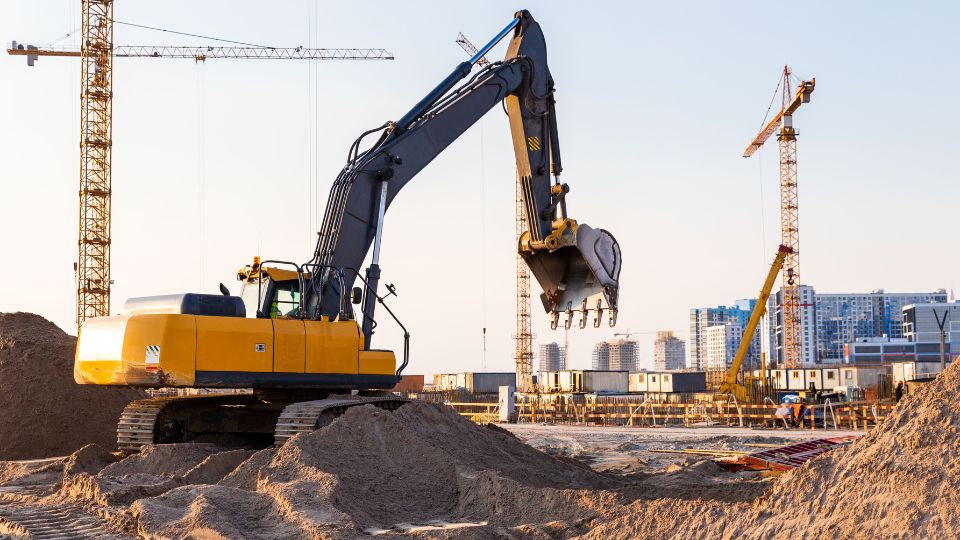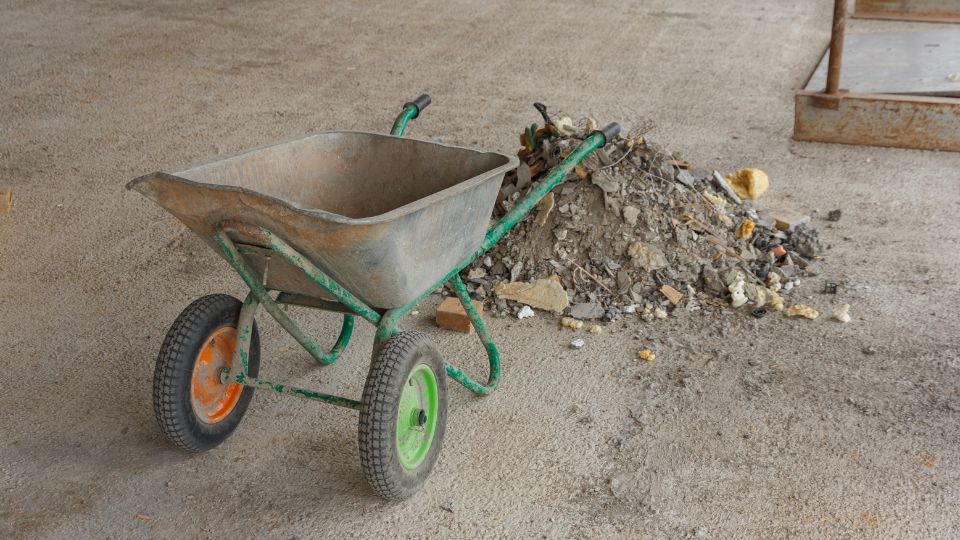
Construction waste poses a significant challenge for the building industry, impacting the environment and requiring careful management.
This guide will provide information to UK-based business owners on various aspects of construction waste, from its types and management to disposal and recycling strategies.
Table of Contents:
- Understanding Construction Waste
- Types of Construction Waste Materials
- Developing a Construction Waste Management Plan
- Company’s responsibility
- Employers’ Responsibilities for Construction Waste
- Employees’ Responsibilities for Construction Waste
- Construction Waste Management Plans In Practice
- UK Construction Waste Regulations
- Key Provisions Affecting Construction Waste
- Preparing for Construction Waste Regulations (Immediate Actions for Businesses)
- How to Dispose of Construction Waste
- How to Save Money on Construction Waste Management
- Conclusion
Understanding Construction Waste
Construction waste presents a significant challenge in maintaining environmental sustainability and resource efficiency, with 75% of such waste ending up in landfills which highlights the importance of proper strategies to manage waste. This waste includes a variety of materials produced during the building process, such as:
Demolition Waste
Demolition stands out as a prolific contributor, leaving behind a trail of diverse materials from various projects. Whether it’s the deconstruction of buildings, dismantling infrastructure elements, or the refurbishment of existing structures, each source generates its own set of demolition waste.
Waste biproduct (Concrete, bricks, metals, wood, glass, and insulation materials are just a few examples of the debris that emerges from these projects.)
Excavation Waste
Excavation waste in the UK encompasses materials generated during the removal of soil, rocks, and other substances from construction sites.
The composition varies, including inert components like soil and gravel, as well as non-inert materials such as plastics, metals, or wood.
Effective management of excavation waste involves on-site segregation to distinguish between inert and non-inert materials, with a focus on recycling inert waste to promote sustainable construction practices.
Building Site Waste
Building site waste in the UK includes a diverse range of materials, including packaging and non-recyclable items generated during construction activities.
Efficient management of waste is crucial for environmental sustainability and regulatory compliance.
Adhering to UK regulations necessitates the development of effective waste management plans, outlining strategies for proper waste segregation and disposal.

Types of Construction Waste Materials
Inert Waste
Inert waste refers to waste materials that do not undergo significant physical, chemical, or biological transformations.
- These materials do not pose a threat to the environment or human health due to their inert nature.
- In the context of construction and demolition, inert waste typically includes non-reactive and non-hazardous substances such as concrete, bricks, tiles, and certain types of soils.
- Inert waste is considered stable and does not decompose, making it suitable for reuse, recycling, or safe disposal in designated landfills.
Recycling inert waste is particularly valuable in sustainable construction practices, as it minimises the need for extracting new raw materials.
Non-Inert Waste
Non-inert waste encompasses materials with the potential for physical, chemical, or biological transformations, presenting environmental and health risks.
- Non-inert waste includes dynamic materials like wood, plastics, metals, and certain insulation types.
- Unlike inert waste, non-inert materials may decompose, react, or contain hazardous components, necessitating careful handling and specialised disposal methods.
- Effectively managing non-inert waste requires specific considerations to prevent environmental harm and comply with regulations.
- The segregation and responsible disposal of non-inert waste are crucial components of waste management plans, ensuring that materials posing environmental risks are handled with care.
Prioritising the recycling of non-inert waste becomes imperative to mitigate the need for new raw materials, fostering more sustainable construction practices and reducing the overall environmental impact across various industries.

Developing a Construction Waste Management Plan
Site Waste Management Plans (SWMPs) are formulated to diminish the volume of waste generated on construction sites by outlining the management of building materials and resultant waste throughout a project.
The plan undergoes updates during construction to document how materials are handled — whether they are reused, recycled, or disposed of.
SWMPs are commonly referred to as Resource Management Plans.

Company’s responsibility
Although there is no specific legal mandate in the UK for a SWMP, its implementation facilitates more effective material management, waste reduction, and cost savings.
Despite the absence of a legal requirement, all construction companies are obligated under s.34 of the Environmental Protection Act 1990 to responsibly manage their waste.
Adopting a SWMP can enhance waste planning awareness, and environmental consciousness among the workforce, and ensure regulatory compliance.
Employers’ Responsibilities for Construction Waste
In the UK, there is no specific legal mandate for a Site Waste Management Plan (SWMP).
However, guidance on SWMPs is available for those who find it beneficial.
Regardless of SWMP adoption, all construction companies must fulfill their duty of care in waste management under s.34 of the Environmental Protection Act.
Legislation identifies waste producers as entities that produce substances or objects requiring disposal, including those sent for recycling or recovery.
Construction project employers may fall into this category, even if waste production responsibility is delegated to a contractor. Hence, an SWMP is a crucial tool in the overall process.
Employees’ Responsibilities for Construction Waste
If an SWMP is implemented, all construction project employees are responsible for its execution and adherence to the plan’s practices.
In all cases, employees must follow their employer’s waste management procedures and comply with relevant aspects of the duty of care for waste.
Construction Waste Management Plans In Practice
Site Waste Management Plans (SWMPs) detail construction site waste and its management. No longer a legal requirement since 2013 in England, they may be needed for BREEAM certification.
While not mandatory for planning, authorities can impose waste management conditions. SWMPs are voluntary in Northern Ireland and Wales, and in Scotland, they’re considered good practice but not obligatory.
Despite these variations, reducing construction waste is vital for legal, economic, and environmental reasons.

UK Construction Waste Regulations
Legal Framework for Construction Waste Management
Amidst the persistent shortages of construction materials experienced in recent years, the construction industry remains a significant contributor to waste generation.
Despite fluctuations in material availability, the industry’s waste production demands attention, necessitating proactive measures.
Construction Waste Statistics and Environmental Impact
Reports from 2018 highlighted that construction, demolition, and excavation activities accounted for a substantial 62% of the UK’s total waste, as per DEFRA.
While material shortages may have influenced this behaviour, the magnitude of waste remains a critical concern.
The Impact of the Environment Act 2021 on Construction Waste Regulations
The recently enacted Environment Act 2021, which received Royal Assent in November, introduces comprehensive measures with far-reaching implications across sectors.
Beyond addressing air quality and biodiversity, the Act significantly targets waste reduction and resource efficiency.
Key Provisions Affecting Construction Waste
The Act grants powers to national authorities to enact regulations aimed at eliminating avoidable waste by 2050. Pertinent provisions include:
- Extension of Producer Responsibility: Producers are to bear the disposal costs of products, starting with plastic packaging.
- Single-Use Plastics Charges: Introducing charges for single-use plastics to discourage their usage.
- Resource Efficiency Information and Requirements: Implementing new resource efficiency standards and information dissemination.
- Regulation of Hazardous Waste Shipments: Relevant to hazardous materials such as asbestos found on construction sites.
- Export Restrictions on Waste: Banning or restricting the export of waste to non-OECD countries.
- Waste Enforcement and Regulation: Strengthening measures for waste enforcement and regulation.
Potential Impact on Construction Industry Practices
The Act amends existing legislation, including the Environmental Protection Act 1990 and the Environment Act 1995.
These changes have the potential to bring about substantial modifications in waste management practices within the construction industry.
Uncertainties and Transition Periods
While the Act empowers national authorities to formulate regulations, the specifics and timeline of these changes remain uncertain.
Anticipated transition periods may provide a two-year window for significant changes related to construction waste to come into effect.
Preparing for Construction Waste Regulations (Immediate Actions for Businesses)

In anticipation of forthcoming construction waste regulations, construction businesses (including developers, contractors, and consultants) can take proactive steps:
- Current Legislation Compliance
Ensure compliance with existing waste legislation to avoid penalties.
- Waste Monitoring and Management Review
Review current waste monitoring and management practices to gauge the scale and nature of waste.
- Designing for Adaptability
Consider designing projects for adaptability, emphasising component and material reuse, recycling, and improved demolition systems.
- Modern Methods of Construction (MMC)
Explore the benefits of using MMC to reduce waste in construction projects.
- Environmental Standards Commitment
Demonstrate commitment to high environmental standards, such as the Common Assessment Standard, covering various risk management areas, including sustainability.
How to Dispose of Construction Waste
Proper disposal of construction waste is essential for environmental sustainability and compliance with waste management regulations.
One effective method is to segregate materials at the construction site, sorting them into distinct categories such as wood, metal, concrete, and hazardous waste.
This facilitates recycling efforts, allowing reusable materials to be diverted from landfills.
Local facilities
Many local recycling facilities accept construction waste, and partnering with these facilities helps ensure that materials like concrete and metals are processed and reused in new construction projects.
Additionally, hazardous waste, such as paint or asbestos, must be disposed of in accordance with specific regulations to prevent environmental harm.
Engaging licensed waste disposal services for hazardous materials ensures their safe removal and proper disposal, reducing potential risks.
Repurpose
In addition to recycling, donating materials that are in good condition but no longer needed in the construction project is another sustainable approach.
Many nonprofit organisations or community groups may welcome donations of surplus building materials, contributing to local initiatives and reducing the overall environmental impact of construction activities.
By implementing a comprehensive waste management plan and utilising recycling and donation options, construction projects can reduce their ecological footprint, promote responsible waste disposal practices, and contribute to a more sustainable future.
How to Save Money on Construction Waste Management
Efficient construction waste management is not only environmentally responsible but can also result in cost savings for your construction project.
Here are some tips on how to save on construction waste management:
- Inventory and Ordering
- Accurately estimate the materials needed to avoid over-ordering.
- Keep a detailed inventory to prevent unnecessary purchases.
- Materials Selection
- Choose materials with minimal packaging.
- Opt for products that can be recycled or reused.
- Lean Construction Practices
- Implement lean construction principles to minimise waste.
- Just-In-Time (JIT) delivery can help reduce excess materials on-site.
- Contractor Selection
- Choose contractors and suppliers committed to sustainable practices.
- Include waste management requirements in contracts.
- Waste Tracking
- Implement a tracking system to monitor the types and quantities of waste generated.
- Use this data to identify areas for improvement.
- Deconstruction Instead of Demolition
- Consider deconstruction rather than traditional demolition to salvage more materials.
- This can be particularly valuable for older buildings with reusable materials.
- Waste-to-Energy Options
- Explore waste-to-energy options for certain types of construction waste.
- Some materials can be converted into energy through processes like incineration.
By adopting these practices, you can not only reduce the environmental impact of your construction project but also potentially save on waste disposal costs and contribute to a more sustainable construction industry.
Conclusion
In conclusion, managing construction waste is a critical aspect of responsible business operations.
By adhering to UK regulations, implementing efficient waste management plans, and embracing recycling practices, businesses can contribute to a greener, more sustainable future.
Share this guide to spread awareness and inspire positive change in the construction industry.
No matter what building waste removal method you use, before the decision is made, all rubbish must be categorised in accordance with the ‘Waste (England & Wales) Regulations’.







